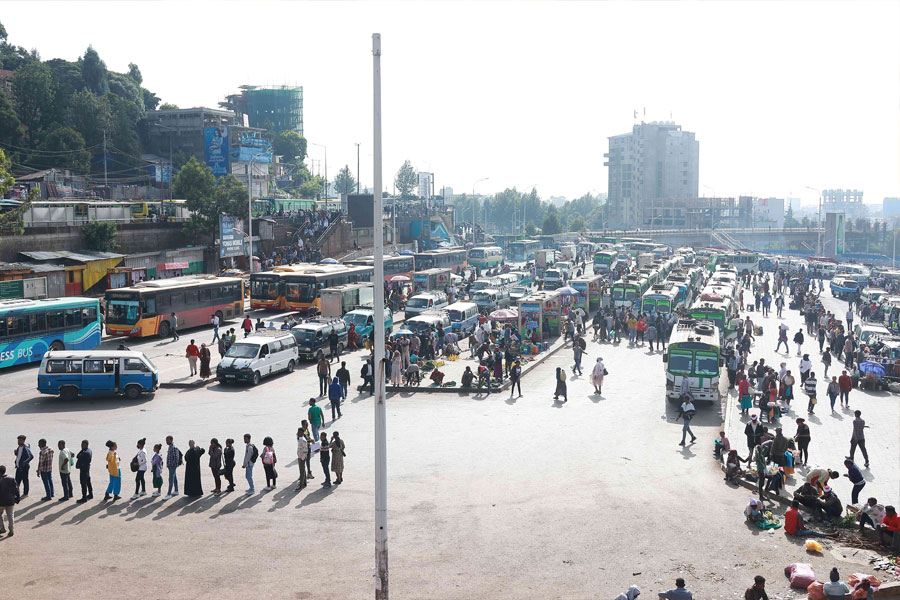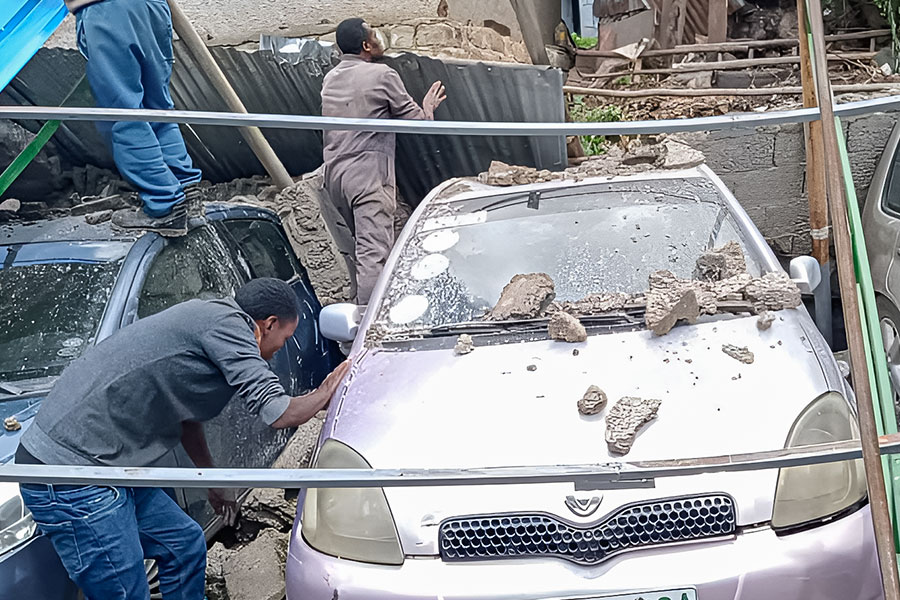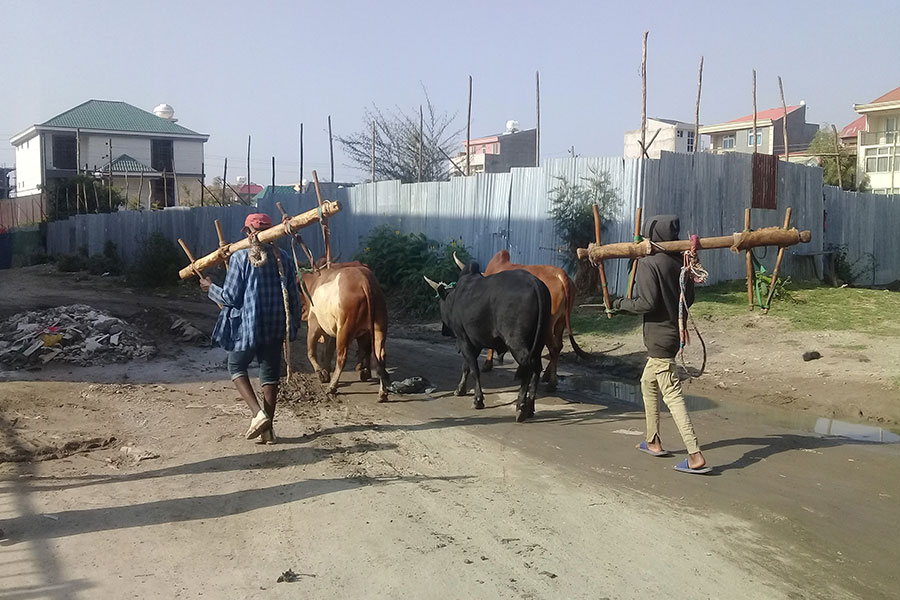
Radar | Nov 09,2024
A station in Qality, on the outskirts of Addis Abeba, was filled last week with heavy trucks and freight loaded with all kinds of imported goods. Four security personnel wearing blue uniforms and keenly observing their surroundings guarded the front gate.
Blue, red and white coloured trucks roam around with roaring sounds from their engines. Inside the compound, three others clad in green uniforms checked each truck’s plate number and loaded items before issuing permits to leave the premises. The dust blows underneath the large tires as the trucks depart.
This was the starting point for the tedious days-long round trip to ports in Djibouti. The trucks make their way to the border.
Customs Controlling & Monitoring Station, a few kilometres off the station, allows drivers to choose which highway to take, with most taking the Dewale route, one of the two roads leading to the borders with Djibouti, an indispensable sea outlet for Ethiopia’s import and export trade. Many find the alternative, the Galafi route, posing a risk; they have security concerns.
Yetsione Shewa, a driver in a white shirt with sunken red eyes, was one of these concerned drivers. His frustration was evident, striding from one place to another with a stack of paper in his hand, searching for the transport authorities. He has been waiting for his truck to be unloaded for four days with no luck. The warehouses were full, and many drivers before him were waiting to unload their freight.
Yetsione hoped to demand payment for staying long, but he found it uneasy.
“I’ve got to wait until next week to unload,” he said. “The system here is debilitating.”
Drivers are paid 2,500 Br a day for staying at the station, depending on how long they get held up.
The father of two and a cross-country driver under Millennium Logistics, he has experienced rough moments on the Galafi road, crossing the Afar Regional State. A truck driver for five years, he witnessed the business getting precarious as he had found it difficult to cross the border through Galafi at night. He recalled an incident; 10 individuals holding hands formed a line in the middle of the road between Awash Arba and Mille towns, awaiting drivers.
For fear of facing imprisonment of six years and a settlement of 350,000 Br if they hit a person, drivers often feel they have no choice but to stop and face the consequences.
“They don’t touch the freights,” Yestione told Fortune. “They only attack and rob drivers.”
He had once been shot in his right arm by robbers who fired at him; they took 10,000 Br.
“Thank God I survived,” he said, showing the scar.
He has faced such troubles two times in the past two years. He claims that police scoffed at his plight and told him to wait until the culprits were found.
However, an officer working for a police commission of the Afar Regional State denied any security problems and claimed things were fine. He declined to be identified and provide further information.
Despite troubles on the highway, drivers are subjected to a 5,000 Br penalty should they fail to make it to the Qality station in three days.
A 16-wheeler freight truck awaits shipment around the Qaliti area, one entry point to the capital.
“We decide whether troubles happen or not,” said Eshetu Fikadu, controlling and monitoring officer at Customs Commission.
The Ethiopian Roads Authority claimed the road leading to Galafi had been rehabilitated. However, the town 163Km from Djibouti city remains detrimental, according to cross-border drivers. Many had been in despair over the rough road and unreliable security on the Galafi highway.
According to Sultan Husen, the customs officer in charge at Galafi checkpoint, the Authority has attempted to reconstruct the road. He agreed that there had been desperate safety issues, with drivers frequently reporting security concerns on the road.
Their predicament is, however, a glimpse of the turmoil the trucking industry has faced lately.
Cross-border freight transport associations have been voicing their concern following a law forcing them to incorporate, ratified by Parliament five months ago. They should transfer accumulated assets in nine months, a decision that displeased the associations’ leaders, who claimed it was made without consultation with those whose interests were most at stake.
Consequent panels were held with officials of the Ministry of Transport & Logistics, under Dagmawit Moges, drawing their concerns on the implementation. Four weeks ago, the Ethiopian Transport Employers’ Federation, formed in 2018 with 4,000 trucks under its fleet, urged changes to be considered after submitting a draft to the Ministry, calling for amendments.
Dejene Luche serves as a public relations officer for the Federation, led by 18 board members representing public and oil transports, dry cargo, and construction. He believes the associations needed time to understand how companies are incorporated, raising the required equity from members within the deadline. He blames transport authorities for burying their faces in the sand, unwilling to see stakeholders’ ordeals.
The law requires the 65 trucking associations to invest in acquiring a minimum of 50 trucks in four months.
“They can’t buy more than two,” Dejene told Fortune. “They risk falling into a diminished state if the transition is rapid.”
Whether mobilised under associations or managed by corporate entities, 11,000 trucks make rounds to Djibouti daily on one of the two corridors.
Dewale town is in the Shinile Zone of the Somali Regional State, 166Km before the border crossing to Djibouti. It also houses a checkpoint on the Addis Abeba-Djibouti railway line.
Ahmed Mohammed, administrative officer at Dewale Customs, confirmed that more trucks were coming through the gates for two months due to the damage Galafi sustained. The capacity of the scanning machines is limited to inspecting 30 to 50 trucks a day. It has been challenging to keep up with an average of 165 trucks passing through the checkpoint.
“We couldn’t handle the excess flow,” he said.
The Ethiopian Customs Commission allows trucks to cross the borders to Djibouti with verified documents, approved by Parliament in 2008. The document contains data on the type of freight, license plate, the driver’s name and address, and the route it is allowed to cross.
Officers at the Dewale customs checkpoint, under the supervision of the Dire-Dewa Customs Commission, issued a notice two months ago to drivers forewarning penalties for crossing the border without an authorised document. Nonetheless, many prefer this route over the Galafi crossing.
“We feel safe crossing through Dewale,” said Tesfaye Argaw. “The road is not as difficult as Galafi.”
Tesfaye is a truck driver under Yegna Freight Association. A father of one, he has been providing freight transport services for nine years, a job that keeps his family on their toes, fearing for him whenever crossing the border. He is frightened to go out on the road after 6:00pm, preferring to spend the night in Mille town, 100Km from Awash.
“We pleaded our case to the Dewale Customs Commission only to be left hanging,” he said.
Fetan Freight Transport Association which has 180 drivers under its wing, has stopped transporting freight from Djibouti since August, limiting its service to the Addis-Adama route. Its General Manager, Mersha Tsega, attributed the decision to growing insecurity.
“The drivers are paying with their lives,” he said.
Girma Deboch was one of the drivers who paid such an ultimate price.
He was 38 years old and a father of three, driving an Isuzu between Addis Abeba and Galafi. Two months ago, passing Undufu, a small town between Gedamytu and Awash Arba, he was forced to stop by gunmen who shot him in the belly. Doctors at the nearby Berta Hospital, where he was rushed, could not have saved his life as the bullet had deeply penetrated his organ.
“I was told of my brother’s death over the phone,” his brother told Fortune.
Awel Seid drove trucks on this route for more than a decade, working for the Continental Freight Transport Association. He witnessed his friends murdered while driving on the Galafi route.
“I saw my friends get killed in cold blood,” he said with an agonising tone.
The risks to life were recurrent in three areas: Adaytu of Mille, Undufo of Gewane, and Gedamaytu of Arambia weredas in the Afar Regional State. Essential locations along the highway, such as grazing lands and water, including the Awash River, are sources of contention between communities in Afar and Somali regional states. The watercourse is immensely valuable for pastoralist communities of both regions who rely on it during the dry season.
What was once a domestic rivalry was transformed into an open and armed conflict last year, making this vital corridor insecure. The Federal and regional police officers had their eyes on the northern war, making it hard to calm the situation.
“Authorities had a difficult time controlling the situation at the time,” said Bereo Hassen, state minister for Transport & Logistics.
In the one year beginning 2021, 35 trucks were hit by robbers, leaving 20 drivers injured. Twelve drivers were killed. The following year, seven drivers were injured and one was killed four months ago. However, the situation has improved considerably; no deaths or injuries have been reported since. Regional prosecutors have charged 35 people suspected of involvement, where conviction led to the sentencing of some defendants to 15 years imprisonment.
"Now things are fine," said Hussien Musa, head of Gabi Rasu Zone 3 Police. "There is nothing to worry about."
Officials of the Ministry of Transport & Logistics, recognising truck drivers’ grievances, discussed with the Federal Police Commission a few months ago and pledged to safeguard the highway. There has been a security improvement, according to Tatek Negash, public relations of the Ministry at the time of an interview with Fortune a few weeks ago.
Transport officials have been having prolonged discussions with heads of the Afar Transport Bureau and freight associations’ leaders.
“There hasn’t been any report of injuries from our side in the last four months,” said Bereo.
Drivers appear to be caving in from past trauma. According to the State Minister, drivers facing security problems should voice their concerns through the freight associations.
One of these associations is led by Dejene Luche. Yegna Cross-Border Level 2B Freight Transport Owners’ Association was established in 2010 by 15 members, with a fleet of 23 trucks. The Association has reached a seven million Birr capital, providing freight transport services from ports in Djibouti to Modjo dry port.
“It hasn’t been any easy, only worse,” said Dejene, who also leads the Federation.
Associations’ leaders argue that the law that allows the Ministry to set tariffs for their services contradicts the transport policy to make a competitive industry.
Dereje Legesse manages Segon Crossborder Freight Transport Association, established in 2009 with more than 230 freight trucks. It is one of the 17 freight associations progressing in the incorporation path. He believes that the associations have not benefited for a long time, and pushing them to incorporate has its benefits if done in time. They can access credit collateralising movable assets; however, he wants to see the transition take not shorter than five years.
“They will be put in jeopardy,” Dereje said, emphasising the importance of an extension period.
Fikadu Petros, a business lawyer at Fekadu Petros & Partners Law Office, echoed the sentiment. For him, whether this will help the economy is a matter to speculate with a prolonged feasibility study. But pushing the associations to lose the identity they held for more than five decades with little to no time is uncalled for. He believes transport authorities should formulate laws and policies after consultations with the associations’ leaders.
“They deserve sufficient time for transition,” he said.
The associations have found only four of the proposed seven modalities, such as partnerships, share or private limited companies, or sole proprietorships, feasible to reinvent themselves, leaving out the limited or liability partnerships and joint venture options.
For Dereje, who doubles as the Federation’s secretary general, the transport and logistics sector has not grown.
“It's incomparably underdeveloped,” he said.
Regulators at the Ministry seem to have ears for associations and the Federation leaders. They are formulating a directive that would apply to the re-formed commercial entities, disclosed Yirga Tadesse, the Ministry’s road transport monitoring and regulations.
“The tariff will be opened to the freight associations,” he said.
One of the re-formed corporate transport firms is Fetan Logistics & Trading S.C., incorporated a month ago with 100 million Br in equity raised from 221 shareholders. The authorities hope the company heralds a new beginning in an otherwise distressed industry.
PUBLISHED ON
Dec 24,2022 [ VOL
23 , NO
1182]

Radar | Nov 09,2024

News Analysis | Feb 03,2024

My Opinion | Aug 13,2022

Fortune News | Oct 20,2024

Fortune News | Aug 18,2024

Radar | Jun 29,2024

Fortune News | Apr 20,2019

Verbatim | Jul 17,2022

Agenda | May 25,2024

Fortune News | Sep 03,2022

Dec 22 , 2024 . By TIZITA SHEWAFERAW
Charged with transforming colossal state-owned enterprises into modern and competitiv...

Aug 18 , 2024 . By AKSAH ITALO
Although predictable Yonas Zerihun's job in the ride-hailing service is not immune to...

Jul 28 , 2024 . By TIZITA SHEWAFERAW
Unhabitual, perhaps too many, Samuel Gebreyohannes, 38, used to occasionally enjoy a couple of beers at breakfast. However, he recently swit...

Jul 13 , 2024 . By AKSAH ITALO
Investors who rely on tractors, trucks, and field vehicles for commuting, transporting commodities, and f...

Jun 28 , 2025
Meseret Damtie, the assertive auditor general, has never been shy about naming names...

Jun 21 , 2025
A well-worn adage says, “Budget is not destiny, but it is direction.” Examining t...

Jun 14 , 2025
Yet again, the Horn of Africa is bracing for trouble. A region already frayed by wars...

Jun 7 , 2025
Few promises shine brighter in Addis Abeba than the pledge of a roof for every family...